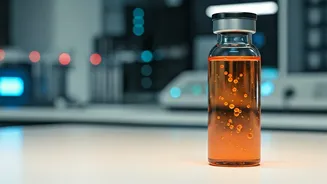Understanding Vitamin D
Vitamin D, a fat-soluble nutrient, plays a crucial role in various bodily functions. It's often called the 'sunshine vitamin' because our bodies produce
it when exposed to sunlight. Vitamin D supports bone health, immune function, and overall well-being. It aids in calcium absorption, maintaining bone density and preventing conditions like osteoporosis. Adequate vitamin D levels are vital for a strong immune system, helping the body fight off infections. While essential, getting too much vitamin D can lead to toxicity, which is a serious concern. It's usually a result of excessive supplementation rather than sun exposure or dietary sources, and can disrupt the body's calcium balance, causing various health problems.
Toxicity: The Risks
Vitamin D toxicity, or hypervitaminosis D, occurs when vitamin D levels in the blood become excessively high. This often results from taking high doses of vitamin D supplements. Unlike other fat-soluble vitamins, the body doesn't easily eliminate excess vitamin D. The primary concern with vitamin D toxicity is its impact on calcium levels. High vitamin D levels can cause excessive calcium absorption from the gut, leading to hypercalcemia, an elevated level of calcium in the blood. This condition can trigger a range of symptoms, impacting kidney, cardiovascular, and gastrointestinal systems. Symptoms can vary, but often include digestive issues, kidney stones, and cardiovascular strain. It's crucial to be aware of the potential hazards and how to prevent them to protect overall health.
Recognizing The Signs
Identifying the signs and symptoms of vitamin D toxicity is vital for early intervention. Early symptoms often include gastrointestinal issues, such as nausea, vomiting, and loss of appetite. These are often vague and could be mistaken for other conditions, so it's essential to consider your vitamin D intake. More severe symptoms of hypercalcemia can occur, including frequent urination, excessive thirst, and dehydration. High calcium levels can also affect the nervous system, potentially causing confusion, lethargy, and in extreme cases, coma. Kidney problems are a significant concern, with kidney stones and kidney failure being potential complications. Cardiovascular effects can also arise. Regular blood tests to check vitamin D and calcium levels are the most reliable way to monitor for toxicity, especially if you take supplements.
Reversing The Effects
If you suspect vitamin D toxicity, several steps can be taken to reverse the condition safely. The first and most critical step is to stop taking vitamin D supplements. Consult your doctor immediately to discuss your symptoms and test results. Medical supervision is essential. Your doctor will likely conduct blood tests to monitor vitamin D and calcium levels. They may also review your current medications and supplements to identify any other potential contributors. Increasing fluid intake is crucial to help the kidneys flush out excess calcium and prevent dehydration. A low-calcium diet may also be recommended to reduce calcium intake and prevent further buildup. In some cases, medications may be prescribed to manage hypercalcemia. For severe cases, hospitalization and intravenous fluids might be required. Regular follow-up appointments and blood tests are essential to monitor your progress and ensure a safe recovery.
Natural Detoxification Methods
While medical intervention is vital for vitamin D toxicity, some natural methods can support recovery. Proper hydration is a cornerstone of recovery. Drinking plenty of water helps flush out excess calcium and supports kidney function. A balanced diet low in calcium can also help reduce calcium intake. Focus on foods low in calcium, such as non-dairy milks, and limit calcium-rich foods like dairy products. Ensure you get adequate sunlight exposure, as vitamin D from sun exposure rarely causes toxicity. However, remember to practice sun safety by avoiding sunburn and excessive exposure. Regular exercise is beneficial for overall health and can support the body's natural detoxification processes. Consulting a healthcare provider is essential before starting any new treatments or making significant dietary changes. They can provide personalized advice based on your condition and overall health.
Prevention Strategies
Prevention is always better than cure. The key to preventing vitamin D toxicity lies in maintaining a balanced approach to vitamin D intake. Prioritize getting vitamin D from natural sources. Ensure that you have adequate sunlight exposure. Consume vitamin D-rich foods, such as fatty fish, egg yolks, and fortified foods like milk and cereals. If taking supplements, follow recommended dosages. Before starting any vitamin D supplementation, consult a healthcare professional. They can evaluate your vitamin D levels and determine the appropriate dosage for your needs. Avoid taking high doses of vitamin D supplements without medical supervision. Regularly monitor your vitamin D levels through blood tests. This can help you track your vitamin D status and detect any potential issues early. By being proactive and informed, you can enjoy the benefits of vitamin D without risking your health.












